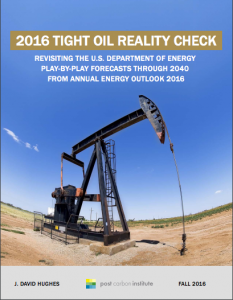Full Title: 2016 Tight Oil Reality Check
Author(s): J. David Hughes
Publisher(s): Post Carbon Institute
Publication Date: September 1, 2016
Full Text: Download Resource
Description (excerpt):
U.S. oil production was thought to be in permanent decline until the advent of tight oil a decade ago, which resulted in rapid growth of domestic oil production. This has led many in recent years to assume that a new, protracted golden age of domestic oil supplies was at hand. Since peaking in March 2015, however, total U.S. tight oil production was down 13% as of June 20161 , and down 19% as of November 20162—a decline in the production rate of more than one million barrels per day. Given that it is the major source of hope for growing or even maintaining U.S. oil production, a view to the future of tight oil is critical for establishing energy policy and avoiding unforeseen supply shortfalls.
Oil production forecasts by the Energy Information Administration (EIA) of the U.S. Department of Energy are published yearly in its Annual Energy Outlook (AEO). These are widely viewed by industry and government as the best available assessment of what to expect in the longer term, with the EIA’s reference case typically viewed as the most likely scenario for future production. In the 2014 report Drilling Deeper3 , I reviewed the credibility of the EIA’s Annual Energy Outlook 2014 (AEO2014) 4 forecasts for the major U.S. tight oil and shale gas plays based on the fundamental geological characteristics of each play; I also developed alternate production forecasts for two major tight oil plays, the Bakken and Eagle Ford. In most plays the AEO2014 production projections were found to be highly optimistic when reviewed in the light of play fundamentals. In the case of the Bakken and Eagle Ford plays, the EIA overestimated recovery of oil through 2040 by 42% compared to my “Most Likely” drilling rate case.
